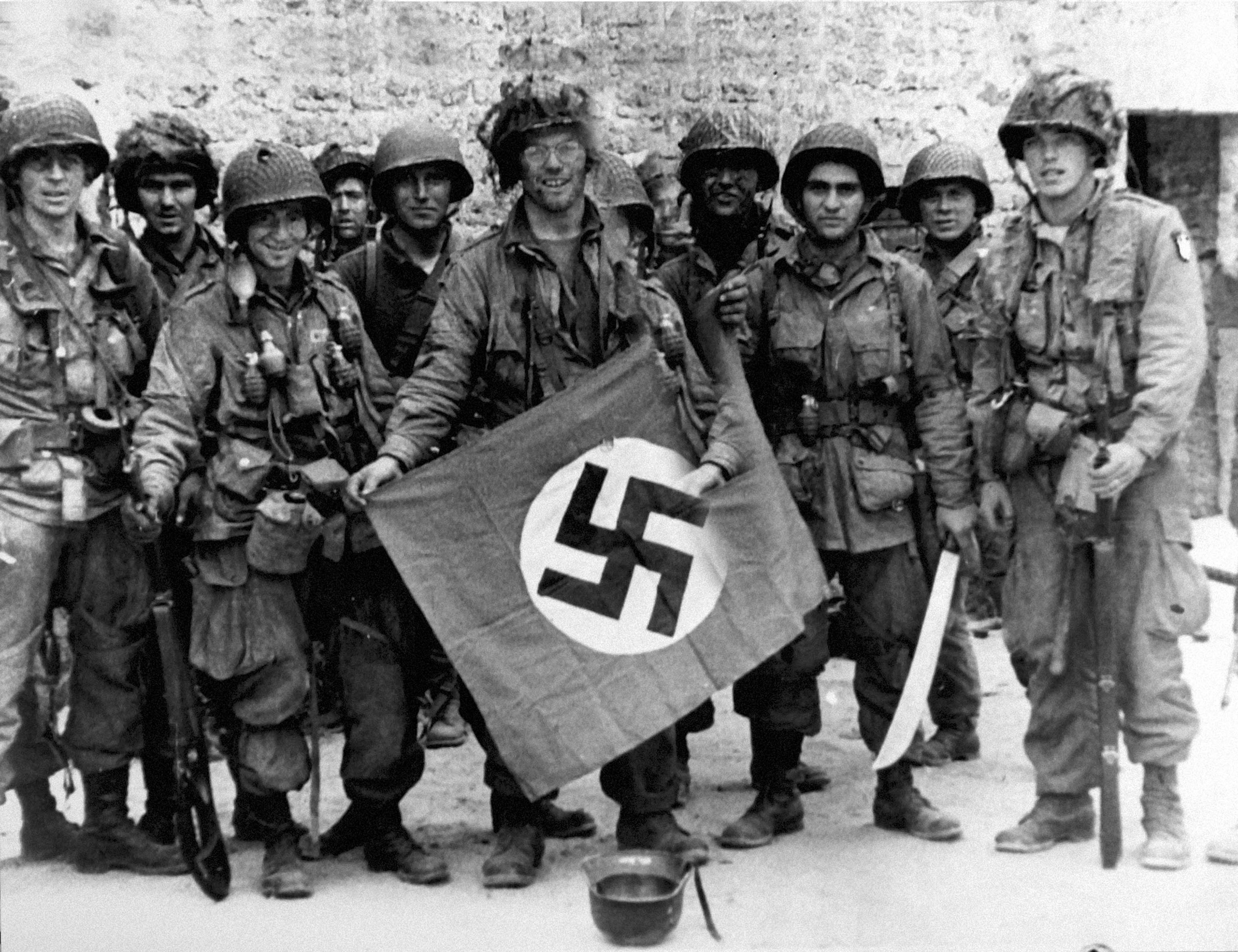D Day: The Airborne Landings
 |
| Gen. Eisenhower addresses US paratroopers of Co. E, 502nd PIR prior to D-Day. (Wikipedia) |
dropped in the wrong locations. Others lost their way and set up far from their intended landing zones. Some teams lost critical equipment when planes carrying it developed mechanical problems and crash landed without reaching Normandy. Others dared not light their visual beacons (without which their radio transponders were almost useless) because German troops nearby would be alerted to their presence and ambush the paratroops as they dropped. In one instance, a British pathfinder team suffered perhaps the worse fate of all; waiting to guide paratroops to land near the Merville Battery, they were bombed by RAF aircraft trying to damage the battery ahead of the paradrop.
 |
| British pathfinders synchronize watches. (Wikipedia) |
 |
| British paratroops and commandos in Normandy. (Wikipedia) |
As a result, many American and British paratroops landed far from their intended drop zones. Individual units often found themselves scattered widely over the Norman countryside, much of it flooded by the Germans in anticipation of an Allied assault. Nearly half of one American regiment landed on the far side of the flooded Merderet River and contributed little to the division's mission on D Day. One British battalion commander took three hours to assemble a force that amounted to less than half of his unit.
 |
| Troops of the 101st Division with a souvenir--a Nazi flag used for air identification. (Wikipedia) |
Nevertheless, the US 82nd and 101st and UK 6th Airborne Divisions accomplished almost all of their D Day missions. The British 6th Airborne seized the Caen Canal and Ourne River Bridges and captured the German battery at Merville (although the battalion that assaulted the latter had only about a quarter of its men assembled when they attacked). Mission Albany, the 101st Airborne's attempt to seize the exits from Utah beach and disrupt German forces attempting to counterattack the landings, was mostly accomplished. Mission Boston, the 82nd Airborne's plan to seize Ste. Mere Eglise and establish blocking positions to protect the beachheads from German attacks, also succeeded, with the "All American" holding the pivotal town and establishing fields of fire over the Merderet crossings.
Normandy '44 Replay
In our battle for Normandy, each of the Allied units arriving by air rolls a die to see how badly they are disrupted by the weather, German flak, equipment failure, human error, and other problems. Results can include "no effect" (perfect landing), "scattered", and the possible loss of one or two steps.
Steps represent damage to the combat ability of the unit; some units have only one step, while others have two or even three steps. Each unit is rated for its ability to move, to fight, and an overall quality rating; when it loses a step, those ratings are reduced. Losing a step could represent casualties, a loss of morale, depletion of ammunition, destruction of critical equipment, or a combination of all these factors. Under some conditions, steps can be added back as replacements bring up the strength of depleted units, more ammunition and equipment are brought forward, and morale improves.
Each division had different challenges to contend with, so each has it's own column to roll on for losses. The British 6th Airborne units, dropping mostly into open terrain not affected by the flooding and close to the coast, has the best chance of arriving unharmed. The units of the 82nd, landing much further from the coast in densely hedged and wooded farm country along the flooded banks of the Merderet River, have the worst table. That of the 101st is of medium grimness.
In our game, the 82nd has problems with its drop. The 507th Parachute Infantry Regiment (PIR) is scattered and takes two step losses. One of these goes into the airborne replacement pool; it represents men who have just become temporarily separated from their units and will rejoin them later. The 505th PIR does better: scattered, but only one step lost (this also becomes a replacement). And the 508th is golden--they take no losses and arrive intact. The two scattered regiments cannot move or attack, accrue replacements, or dig in effectively. But they can defend at full strength, and they will recover after the first full Allied turn is complete.
The 101st likewise has a mixed bag of results. the 506th PIR lands without a hitch, but the 501st and 502nd both become scattered and each takes a step loss.
The British, with their usual sang-froid, roll two 5s and a 6; not even a button out of place, their troops assemble quickly and quietly in the drop zones to carry out a bloody night's work.
Next time: The main beach landings and the drama of the Rangers at Pointe Du Hoc.


No comments:
Post a Comment